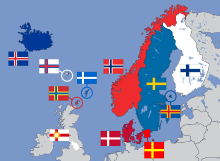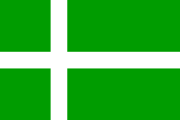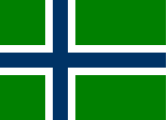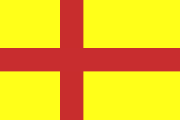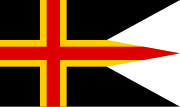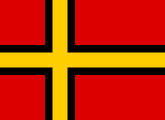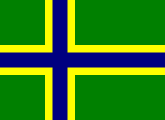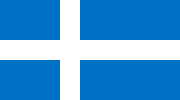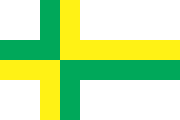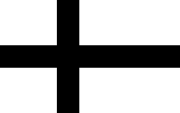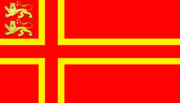List of flags with Scandinavian cross
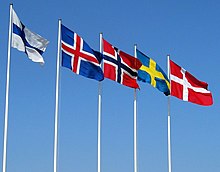
This list brings together flags that have the Scandinavian cross in common.
The Scandinavian or Northern European countries and areas show a Scandinavian cross in their flag. The reason for this is the long-term historical-political development in Northern Europe: First used in Denmark, the basic form was used in the Kalmar Union ; the Icelandic and Norwegian flags emerged from the connection with Denmark in phases of gradual break-up. Today the common lying cross is also seen as an expression of the Nordic community of values.
Instead of the term "Scandinavian cross", the term Philippus cross is used in heraldry . Another name is Cross of the North by analogy with the constellation Cross of the South , which is shown several times in national flags.
Scandinavia in the cultural, geographical and political sense includes Sweden , Norway , Denmark , Finland and Iceland . These states are closely related culturally, so that a "Scandinavian identity" has emerged.
Flags of member countries of the Nordic Council
| Denmark (Danmark) - See also: Flag of Denmark | |

|
The cross flag was the hallmark of the crusaders in the Middle Ages, but the flag of Denmark took on the typical Scandinavian shape with an extended arm of the cross early on. There is a white cross on a red background, which is shifted towards the pole side. The Danish flag is known as the " Dannebrog ". It is probably the oldest flag in the world and has remained unchanged since its inception. The colors come from the coat of arms, which is a white cross with a red border on a quartered shield. |
| Sweden (Sverige) - See also: Flag of Sweden | |

|
The Swedish flag, like the Danish, comes from the colors of the coat of arms of the royal family. The blue color is the basic color of the coat of arms, yellow are the three crowns and stripes in the coat of arms. Hence the blue base color with the yellow cross. |
| Norway (Norge / Noreg) - See also: Flag of Norway | |
| The Norwegian flag comes only partially from the colors of the royal family. Rather, it is based on the Danish flag, with a red background and a white cross. Through the Danish-Norwegian personal union , Norway was de facto part of Denmark from 1380 to 1814. The red background, however, also comes from the royal coat of arms, where red - behind a yellow heraldic animal - is the basic color. The blue color represents the deep blue fjords and clear air. | |
| Finland (Suomi / Finland) - See also: Flag of Finland | |
| The Finnish flag is not based on the national coat of arms . The white background represents the snow, the blue cross represents the lakes. The coat of arms has been adopted from the Swedish era, it is a red coat of arms with a yellow lion. From 1917 to 1918 the coat of arms was temporarily the national flag of Finland, as a coat of arms flag. | |
| Iceland (Ísland) - See also: Flag of Iceland | |

|
Blue and white are the colors of Iceland. Hence the blue underground (the sea) and the white cross (the snow). The red cross on the white cross is supposed to represent the historical affiliation to Denmark. Iceland was part of Denmark until 1944. |
Autonomous Territories
| Åland - See also: Flag of Åland | |

|
The Åland flag combines the colors of the Swedish flag and the Finnish coat of arms . The blue background and the yellow cross represent the good relations with Sweden, the red cross on the yellow cross represents the basic color of the Finnish coat of arms. Red and yellow were the Swedish coat of arms colors for Finland when Finland was still under Swedish rule. |
| Faroe Islands (Føroyar / Færøerne) - See also: Flag of the Faroe Islands | |

|
The Faroese flag comes from the Norwegian flag, but with a reversed order of colors. The colors represent the blue-red-white national costume, which are also the national colors of the Faroe Islands. Since the Faroe Islands were originally settled from Norway, a close connection still exists today, which is documented by the colors of the flag. |
International flags
| Kalmar Union - See also: Flag of the Kalmar Union | |

|
The flag of the Kalmar Union , an association of the kingdoms of Denmark, Norway and Sweden from 1397 to 1523, was introduced by King Erik VII in 1430 at the latest as an imperial banner for ceremonial occasions. The flag, also known as the flag of the north , is used again today by supporters of Scandinavianism . The colors come from the Norwegian coat of arms . |
| Nordic Council - See also: Flag of the Nordic Council | |
| Nordic flag company | |

|
Combination of the flag of the Kalmar Union and the FIAV node. |
Danish flags
The regions in continental Denmark that mark their independence with their own unofficial flags include the Danish islands of Bornholm with the Bornholms flag and Ærø with the Ærø flag and the historic Danish province ( Syssel ) Vendsyssel with the Vendelbrog .
| Bornholm - See also: Bornholm flag | |

|
The Flag of Bornholm combined the red of Danish flag with a green cross, which stands for the green nature of the island. Another variant of this flag shows a white border around the green cross. |
| Vendsyssel - See also: Flag of Vendsyssel | |

|
The flag of Vendsyssel , designed in 1976, is also called Vendelbrog . The blue background is covered with a green cross with a yellow-orange contour. Blue symbolizes the sky and the sea. Green stands for the kale and the fertile vegetation and yellow-orange for the sun, the beach and the dunes. |
| Greenland (1st proposal) - See also: Flag of Greenland | |

|
1. Proposed flag of Greenland |
| Greenland (2nd proposal) - See also: Flag of Greenland | |

|
2. Greenland flag proposal |
| Greenland (3rd proposal) - See also: Flag of Greenland | |

|
3. Proposed flag of Greenland |
| Greenland (4th proposal) - See also: Flag of Greenland | |

|
4. Proposed flag of Greenland |
Swedish regional flags
For many historical provinces, which are called Landskap (German: "Landscape"), there are other flags in addition to the official coat of arms banners, which were mostly designed on private initiative in modern times. With the exception of the flag of Skåne, they have no official status, but are often better known than the official flags and are often used to demonstrate regional independence and to promote regional tourism.
| Skåne - See also: Flag of Skåne | |
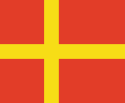
|
The flag of Skåne , designed in 1902, has had official status since 1999 and is a mixture of the Danish and Swedish flags. The red background is taken from the Danish flag and indicates the long Danish tradition and past. The golden cross comes from the Swedish flag and indicates that it belongs to Sweden. |
| Bumpy - See also: Flag Bohusläns | |

|
The unofficial flag of Bohuslän , designed by a fishmonger from Grebbestad in Tanum Municipality , has been in use since 1996. The shades of blue represent the sky and the sea. The color of the red cross symbolizes granite as a testimony to the ancient stone industry . |
| Gotland - See also: Flag of Gotland | |

|
The cross flag proposed in 1991 for Gotland is yellow and overlaid with a green Scandinavian cross. The yellow background should stand for the many fields and the fertile soil of Gotland, the green cross should represent the forest in the middle of the country. When the color is reversed, the Gotland flag resembles the flag of Öland (yellow cross on a green background). It was never introduced. |
| Härjedalen - See also: Flag of Härjedalen | |

|
The unofficial flag of Härjedalen was created in the 1970s as a reaction to the cultural and marketing project Republic of Jämtland to demonstrate Härjedalen's independence from Jämtland County . The colors are taken from the Härliga Härjedalen advertising campaign . |
| Hälsingland | |

|
The unofficial flag of Hälsingland was designed by Bisse Thofelt and has been in use since 1992. In contrast to the Swedish flag , the yellow cross still has a red outline. Blue stands for the sky, the mountains, the lakes and for poetry. The red color symbolizes the heart, the blood and the cranberries . Yellow stands for the sun and the cloudberries . |
| Öland | |

|
The unofficial flag of the Baltic island of Öland is similar to the Gotland flag , only with the opposite color. The green background represents the vegetation on the island. The yellow cross, which can also be found in the Swedish flag , indicates that it belongs to Sweden. |
| Östergötland - See also: Flag of Östergötland | |

|
The unofficial flag of Östergötland was presented to the public in 1972 and corresponds to the flag of Sweden with the reverse color scheme. Blue symbolizes the two canals Göta Canal and Kinda Canal , which both lead through Östergötland. Yellow stands for the Östergötland plain and its fertile cornfields. |
| Småland - See also: Flag of Småland | |

|
The flag of Småland was designed in 1992. Green symbolizes the gardens, orchards and forests of the province. On the one hand, red stands for the houses in the region that are painted in traditional Falun red, and on the other hand for the red cranberries . The flag is assigned a semi-official status. |
| Västergötland | |

|
The unofficial flag of the historic province of Västergötland also applies to western Sweden. It was designed by Per Andersson in 1990. Their colors are taken from the national coat of arms of the Kingdom of Sweden . |
| Ladonia | |

|
The flag of the micronation of the southern Swedish coast shows a green variant of the Scandinavian cross. |
Ethnic groups and minorities
| Finland-Sweden - See also: Flag of the Finland-Sweden | |

|
The flag of Finland-Swedes , the Swedish-speaking minority in Finland, is based on a proposal from 1917. It incorporates the colors of the coat of arms of Finland , which dates from when the country was still under Swedish rule. |
| Swedish Finns - See also: Flag of the Swedish Finns | |

|
The flag of the Swedish Finns, the Finnish minority in Sweden, was introduced in 2007 and is a combination of the Finnish and Swedish flags. As a result, the flag symbolizes the dual identity with two cultures and languages. |
Finno-Ugric peoples in Russia
| East karelia | |

|
The flag designed by the Finnish artist Akseli Gallen-Kallela was supposed to represent the independence of East Karelia from Russia. After the division of Karelia between Russia and Finland in 1918, there were attempts at autonomy in the Russian part from 1919 to 1920, but attempts to break away failed. Black stands for the earth and the "sad" history of the region. Green symbolizes the lush forest and the hope for a better future. Red stands for blood and joy. |
| Ingermanland (Inkeri) | |

|
Ingermanland is a historic Swedish province in northwestern Russia around what is now Saint Petersburg . The flag of Ingermanland , a symbol for the Finno-Ugric peoples of the Ischoren and Ingermanland , was created based on the Swedish flag. Yellow and blue are supposed to symbolize the bond with Sweden, the red contour indicates the origin of the people from Finland, ruled by Sweden, whose coat of arms has the basic color red. In the 1920s and 1930s the flag had official status for the area. |
| Wepsen | |

|
The Wepsen are a Finno-Ugric people who live in Karelia around Lake Onega and around Saint Petersburg . The flag was introduced at the 1992 Wepsic Summer Festival. The green background symbolizes the forest, blue stands for the lakes and yellow for the fields. |
| Woten | |

|
The Woten are a small Baltic Finnish people in Ingermanland, related to the Estonians . The flag is based on a proposal by Valoczy Ferenc and has no official status. The blue color is taken from the flag of Finland, green from the flags of the Wepsen and Liven as well as the historical flag of East Karelia. |
Predecessor to the Icelandic national flag
| Hvítbláinn - See also: Flag of Iceland | |

|
The Hvítbláinn ("the white and blue") prevailed as Iceland's first, unofficial national flag and almost corresponded to the current flag of Shetland . It was published in 1897 by the poet Einar Benediktsson in his first Icelandic daily newspaper, Dagskrá , which he founded. But the Hvítbláinn was rejected by the flag committee and replaced by the civil flag of Iceland, created in 1913. |
| Flag design from 1914 - See also: Flag of Iceland | |

|
Unaccepted flag design by Magnus Thordarson, 1914 |
Predecessor of the Åland national flag
| Åland - See also: Flag of Åland | |

|
Flag proposed in 1952 |
United Kingdom
Official flags
| Shetland - See also: Flag of Shetland | |

|
The Shetland flag has two meanings. On the one hand, the colors dark blue and white refer to belonging to Scotland and, on the other hand, the Scandinavian cross to belonging to the Scandinavian family of peoples. Designed in 1969, the flag was recognized by the Scottish Heraldry Authority in 2005. |
| Orkney - See also: Flag of Orkney | |

|
The flag of Orkney became the archipelago's official flag in the spring of 2007 following a competition. The colors red and yellow come from both the Scottish and the Norwegian national coats of arms. The blue color comes from the Scottish flag and represents the sea and the islands' maritime tradition. |
| West Riding of Yorkshire | |

|
The West Riding of Yorkshire is one of the three historic areas of the English county of Yorkshire. The area has had an official flag since a competition in May 2013. The flag is a Scandinavian cross in red and white, with the white rose of the House of York and the yellow rays of the sun in the center of the cross. The flag symbolizes the connection between English and Nordic history. |
| Caithness | |

|
Caithness is a traditional county of Scotland . After a competition in January 2016, the county now has an official flag. It shows a Scandinavian cross in blue, yellow and black with a sailing ship in the canton. There is a raven on the main sail of the ship. The flag is supposed to symbolize the ancient connections to the Vikings. |
More flags and suggestions
Unofficial flag for South Uist , Scotland
Party flags
| Nasjonal Samling | |

|
Flag of the Norwegian fascist party Nasjonal Samling (founded 1933, disbanded 1945) under Vidkun Quisling . |
German flags
Designs for the national and war flag
A first draft, which arranged the German national colors (then still black-white-red ) as a Nordic cross, comes from Prince Adalbert of Prussia and was proposed by him as the naval war flag for the planned German Union . However, it was not introduced because Prussia had to drop its union plans at the end of 1850. About 76 years later a flag draft appeared in the brochure Die Reichseinheitsflagge , which is attributed to the vexillologist Ottfried Neubecker . He arranged the now black, red and gold German national colors as a Nordic cross, namely as a red cross in front of a gold cross on a black flag cloth. This draft was intended to end the flag dispute that was prevailing at the time . In addition, a variant of the Neubecker flag with a tongued double stand was in circulation as a proposal for a new Reich War flag . In the run-up to the assassination attempt on July 20, 1944 , Josef Wirmer designed the Wirmer flag named after him . This was to become Germany's new flag after the successful overthrow of the Nazis . However, this did not happen because the attack failed. In 1948/49 the CDU / CSU faction in the Parliamentary Council introduced a variant of the Wirmer flag as a proposal for the new national flag on the initiative of Josef Wirmer's younger brother Ernst . This draft was rejected by a majority by the Parliamentary Council, but served as a model for the party flags of the CDU and FDP , which were in use until the 1970s. Since 2010, the Neubecker and Wirmer flags and their variants have been used more and more by groups such as the German Defense League , PEGIDA and the Politically Incorrect blog , which made Anton Wirmer, Josef Wirmer's son, "appalled".
Proposal for the German national flag from 1926, presumably by the vexillologist Ottfried Neubecker
Proposal for a German naval war flag (Neubecker flag with tongue double stand)
Planned German flag of the conspirators of July 20, 1944 ( Wirmer flag )
Ernst Wirmer's proposal for the German flag from 1948
Proposal by the CDU / CSU in the Parliamentary Council in 1948 for the German flag
More flags
Civil flag of the Grand Duchy of Oldenburg from 1774 to 1919
Flag of the autonomous Saarland from 1947 to 1956
Noordlandflagg as a symbol for the Low German language community and areas characterized by Low German, developed in the late 1980s
Baltic countries
National flag of Estonia proposed by politician Kaarel Tarand in 2001
Flag for the short-lived United Baltic Duchy
Crossed flag of the Latvian city of Cēsis with the city coat of arms and the colors of the flag of Latvia
France
Flag of the Mouvement Normand (autonomy movement in Normandy )
Norman flag from Falaise , birthplace of William the Conqueror , indicating its Scandinavian origins.
More flags
The so-called flag of Vinland , designed by the singer Peter Steele of the band Type O Negative
Draft for the Belarusian flag (1992)
See also
literature
- Per Andersson: Nordiska korsflaggor . Draking, Stockholm 1992, ISBN 91-87784-04-1 (Swedish).
Web links
- FOTW website of the international vexillological association Flags of the World (English)
- Flaggenlexikon.de (private site)
Individual evidence
- ↑ The constellation of the swan , also unofficially referred to as the Northern Cross , has no influence on the flag.
- ↑ North. Flags of the World, accessed July 23, 2010
- ^ Bornholm (Denmark). Flags of the World, accessed July 23, 2010
- ↑ Vendsyssel (Denmark). Flags of the World, accessed July 23, 2010
- ↑ Scanian cross flag (Sweden). Flags of the World, accessed July 23, 2010
- ^ The Flag of Scania. ( Memento of the original from July 3, 2015 in the Internet Archive ) Info: The archive link was inserted automatically and has not yet been checked. Please check the original and archive link according to the instructions and then remove this notice. Stiftelsen Skånsk Framtid (English) accessed on 23 July 2010
- ↑ Bohuslän, unofficial flags and flag proposals (Sweden). Flags of the World, accessed July 23, 2010
- ^ County of Gotland (Sweden). ( Page no longer available , search in web archives ) Info: The link was automatically marked as defective. Please check the link according to the instructions and then remove this notice. Flags of the World, accessed July 23, 2010
- ↑ Gotland ( Memento of the original from March 3, 2009 in the Internet Archive ) Info: The archive link was inserted automatically and has not yet been checked. Please check the original and archive link according to the instructions and then remove this notice. Skandia (Swedish), accessed July 23, 2010
- ↑ Harjedalen, unofficial flags and flag proposals (Sweden). Flags of the World, accessed July 23, 2010
- ↑ Halsingland, unofficial flags and flag proposals (Sweden). Flags of the World, accessed July 23, 2010
- ↑ Oland, unofficial flags and flag proposals (Sweden). Flags of the World, accessed July 23, 2010
- ↑ The Flag of Öland. Scandinavia Travel, accessed July 23, 2010
- ↑ The Flag of Ostergotland . Skandia Travel, accessed July 23, 2010
- ↑ Småland, unofficial flags and flag proposals (Sweden). Flags of the World, accessed July 23, 2010
- ↑ The Flag of Västergötaland. Scandinavia Travel, accessed July 23, 2010
- ↑ Västgötland. ( Memento of the original from December 3, 2011 in the Internet Archive ) Info: The archive link was automatically inserted and not yet checked. Please check the original and archive link according to the instructions and then remove this notice. Skandia (Swedish), accessed July 23, 2010
- ^ Swedish speaking population in Finland. Flags of the World, accessed July 23, 2010
- ↑ Sverigefinska flaggan . ( Memento of the original from September 23, 2009 in the Internet Archive ) Info: The archive link was inserted automatically and has not yet been checked. Please check the original and archive link according to the instructions and then remove this notice. Swedish Finns (Swedish). Retrieved July 23, 2010
- ^ East Karelia (Russia), 1919-1920. Flags of the World, accessed July 23, 2010
- ^ Ingria (Russia). Flags of the World, accessed July 23, 2010
- ↑ Vepsia (Russia). Flags of the World, accessed July 23, 2010
- ↑ Votia (Russia). Flags of the World, accessed July 23, 2010
- ↑ Björn Thorsteinsson: Iceland - Politics Danmarkshistorie . Politics Forlag, 1985, ISBN 87-567-3885-4 , p. 242 ff. (Danish)
- ↑ Shetland Islands (United Kingdom). Flags of the World, accessed July 23, 2010
- ^ Postman designs new Orkney flag . BBC News , April 10, 2007, accessed July 23, 2010
- ↑ Orkney Islands (United Kingdom). Flags of the World, accessed July 23, 2010
- ↑ W est Riding Flag . andystrangeway.wordpress, accessed December 1, 2013
- ^ Winner of Caithness flag competition announced . BBC News , January 26, 2016, accessed May 5, 2016
- ↑ Barra (Barraigh). Flags of the World, accessed July 23, 2010
- ^ South Uist. Flags of the World, accessed July 23, 2010
- ^ Christian Democratic Union 1953 – c1970 (Germany) . In: Flags of the World, accessed October 19, 2015.
- ↑ Jan Schlürmann 2015, pp. 340–341.
- ↑ Christina Hebel: Pegida and the Wirmer flag: "I'm horrified" . In: Spiegel Online , August 3, 2015. Accessed October 19, 2015.
- ↑ Flags of the World : Prince Adalbert's 1849 Proposals (Germany) (Engl.)
- ↑ Flags proposed by an unknown author, perhaps Neubecker (Germany). Flags of the World, accessed July 23, 2010
- ^ Arnold Rabbow: Ottfried Neubecker turns 100 . flaggenkunde.de, March 22, 2008. Retrieved November 3, 2015.
- ↑ a b c Proposals 1944-1949 (Germany). ( Memento of the original from April 30, 2017 in the Internet Archive ) Info: The archive link was inserted automatically and has not yet been checked. Please check the original and archive link according to the instructions and then remove this notice. Flags of the World, accessed July 23, 2010
- ^ Grand Duchy of Oldenburg 1815-1918 (Lower Saxony, Germany). Flags of the World, accessed July 23, 2010
- ↑ 'Noordlandflagg. Show flag for Low German ' , accessed on September 2, 2017.
- ↑ Eesti Lipp 120. ( Memento of the original from October 13, 2010 in the Internet Archive ) Info: The archive link was inserted automatically and has not yet been checked. Please check the original and archive link according to the instructions and then remove this notice. Riigiarhiiv (Reichsarchiv) (Estonian), accessed July 23, 2010
- ^ Symbols of Pärnu. ( Memento of the original from August 18, 2010 in the Internet Archive ) Info: The archive link was inserted automatically and has not yet been checked. Please check the original and archive link according to the instructions and then remove this notice. City of Pärnu, accessed July 23, 2010
- ↑ Koigi (Järvamaa, Estonia). Flags of the World, accessed February 10, 2013
- ↑ Lipp. Setomaa (Estonian), accessed February 10, 2013
- ^ Baltic Duchy (1918). Flags of the World, accessed July 23, 2010
- ↑ About Aluksne. ( Memento of the original from June 15, 2010 in the Internet Archive ) Info: The archive link was inserted automatically and has not yet been checked. Please check the original and archive link according to the instructions and then remove this notice. Tourism Latvia, accessed July 23, 2010
- ↑ About Cesis. ( Memento of the original from June 15, 2010 in the Internet Archive ) Info: The archive link was inserted automatically and has not yet been checked. Please check the original and archive link according to the instructions and then remove this notice. Tourism Latvia, accessed July 23, 2010
- ↑ Ventspils (Latvia). Flags of the World, accessed July 23, 2010
- ^ Mouvement Normand (Autonomist movement, Normandy, France). Flags of the World, accessed July 23, 2010
- ↑ Flags used by Musicians - Type O Negative. Flags of the World, accessed July 23, 2010
